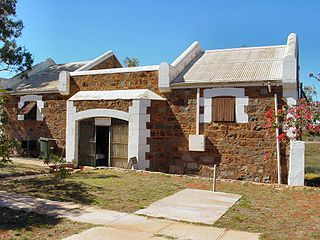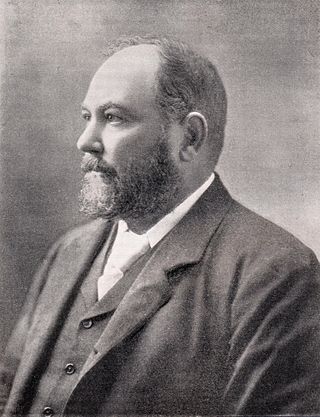Related Research Articles
The human history of Western Australia commenced between 40,000 and 60,000 years ago with the arrival of Aboriginal Australians on the northwest coast. The first inhabitants expanded across the east and south of the continent.

Roebourne is a town in Western Australia's Pilbara region. In the Ngarluma language, Roebourne is called Yirramagardu (Ieramagadu). It is 35 km from Karratha, 202 km from Port Hedland and 1,563 km from Perth, the state's capital. It is the only town on the North West Coastal Highway between Binnu and Fitzroy Crossing; over 2,000km. It is located within the City of Karratha. It prospered during its gold boom of the late 19th century and was once the largest settlement between Darwin and Perth. At the 2016 census, Roebourne and the surrounding area had a population of 981.
The Western Australian Legislative Assembly is elected from 59 single-member electoral districts. These districts are often referred to as electorates or seats.

Lockier Clere Burges was an early settler in colonial Western Australia who became a leading pastoralist in the colony, and a Member of the Western Australian Legislative Council.

The Maitland Brown Memorial, also known as Explorers' Monument, is a monument located in Esplanade Park in Fremantle, Western Australia. Unveiled on 8 February 1913, it is approximately 6 metres (20 ft) high, and consists of a head and shoulders statue of Maitland Brown sitting on granite pedestals on a granite base inset with five plaques, one depicting three explorers, Frederick Panter, James Harding and William Goldwyer. Brown died on 8 July 1905, 7 years prior to the unveiling of the monument, and Panter, Harding and Goldwyer 48 years prior on 13 November 1864. The monument was commissioned by George Julius Brockman who is depicted by one of the five plaques, and the statue of Brown was sculpted by Pietro Porcelli. Because the monument as originally erected is biased, such as by celebrating the colonists "as intrepid pioneers" in contrast to the Aboriginal people that "are condemned as treacherous natives", an additional plaque was added on 9 April 1994 but leaving the original offensive and biased aspects in place.
William Goldwyer was a police officer and explorer in colonial Western Australia. While exploring in the Kimberley region of Western Australia in 1864, he was killed by Aboriginal Australians.
James Harding was a British-Australian pastoralist and explorer in colonial Western Australia. While exploring in the Kimberley region in 1864, he was killed by Aboriginal Australians. In February 1913, a monument to Panter, Harding, Goldwyer and Brown, the Explorers' Monument, was unveiled in Fremantle.
Frederick Kennedy Panter was a police officer, pastoralist and explorer in colonial Western Australia. While exploring in the Kimberley region of Western Australia in 1864, he was killed by Aboriginal Australians.

The La Grange expedition was an expedition in 1865 to the vicinity of Lagrange Bay in the Kimberley region of Western Australia. Led by Maitland Brown, the expedition initially searched for three settlers who had failed to return from an earlier exploring expedition. The three men were eventually found dead, having been speared and clubbed to death by Aboriginal Australians, some apparently in their sleep. Between six and twenty Aboriginal Australians were subsequently killed by members of the expedition in a controversial protracted fight that is often now referred to as the La Grange Massacre.

Maitland Brown was an explorer, politician and pastoralist in colonial Western Australia. He is known as the leader of the La Grange expedition and massacre, which searched for and recovered the bodies of three colonists killed by Aboriginal Australians, and killed between six and twenty Aboriginal Australians that remains controversial to this day.
William Burges was an early settler in Western Australia who became a pastoralist and a Member of the Western Australian Legislative Council.

John Nicol Drummond (1816–1906) was an early settler in Western Australia. He became the colony's first 'Inspector of Native Police', and helped to explore the Champion Bay district before becoming one of the district's pioneer pastoralists.

Francis Thomas "Frank" Gregory was an Australian explorer and politician.
Bowes Station is a pastoral lease and sheep station located in the Mid West region of Western Australia.

Robert John Sholl was a government administrator, magistrate, explorer, journalist, entrepreneur, harbourmaster, customs official, postmaster and lay reader in Western Australia (WA), during the colonial era. Because of his multiple, simultaneous roles, which carried judicial, political, cultural and commercial power and influence, Sholl is regarded as a significant figure in the history of North-West Australia, at an early stage of its settlement by Europeans.
Peter Hedland originally Lars Peter Hedlund, 14 March 1829 – 1881, was a significant figure in European settlement in North-West Australia. A mariner, explorer, and pearler; he was widely known as "Captain Hedland". Some contemporary accounts and some of Hedland's descendants have spelt the surname Headland, although it is not clear that he ever used this spelling.
Cooya Pooya Station most often referred to as Cooya Pooya or Cooyapooya is a pastoral lease operating as a sheep station in Western Australia.
The Karajarri are an Aboriginal Australian people, who live south-west of the Kimberleys in the northern Pilbara region, predominantly between the coastal area and the Great Sandy Desert. They now mostly reside at Bidyadanga, south of Broome. To their north live the Yawuru people, to the east the Mangala, to the northeast the Nyigina, and to their south the Nyangumarta. Further down the coast are the Kariera.

Elections were held in the Colony of Western Australia in June and July 1894 to elect 33 members to the Legislative Assembly. Less than half of the seats were contested and virtually all campaigns were fought on local issues, although a few candidates were endorsed by extraparliamentary organisations. The election presented no threat to the government of Sir John Forrest, but its aftermath saw the establishment of a credible opposition for the first time, led by George Randell.
Edward Wilson Landor (1811–1878) was a lawyer, scholar, writer and pioneer in the early days of the British colony of Western Australia.
References
- Lockier Clere Burges, c. 1919, Pioneers of Nor'-West Australia, pastoral and pearling, Perth WA, People's Printing & Publishing Co.